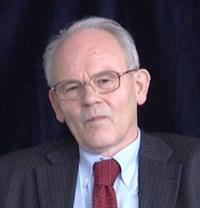The Velvet Revolution was the God’s gift and a real miracle. It was our fathers’ and grandfathers’ dream

Stáhnout obrázek
Jozef Mikloško was born on March 31, 1939 in Nitra. After finishing the Eleven-year Secondary School he earned a degree at the University of Pedagogy in Bratislava where he graduated in mathematics and chemistry. After a short a period of time when he worked as a secondary school teacher in Nové Zámky, in the early 1960s he served the attendance military service in Lipník nad Bečvou. Besides sports he engaged in science. He found a job in the Slovak Academy of Sciences as a research worker at the Institute of Technical Cybernetics, where he worked until the year 1990. When he was working at the Academy, he managed to graduate at the Faculty of Natural Sciences of Comenius University in numerical mathematics, which he lectured on at the Faculty of Mathematics and Physics in Bratislava until 1989. In the late 1980s he held a post of the chief of the international Base Department for Artificial Intelligence. He reproached the communist regime mainly for its uncompromising attitude towards people with different opinion and for suppression of religious freedom. He was actively involved in the activities of the underground church and organised regular gatherings of families, children, and youth. After the Velvet Revolution in 1989 he became a member of the Slovak National Council; however, a bit later, he decided to go and work in Prague, so he had to surrender his mandate. Until 1992 he held a position of the Deputy Prime Minister of the Czech and Slovak Federative Republic for human rights and briefly he also worked as a member of the Chamber of the People of the Federal Assembly. After the dissolution of Czechoslovakia, he worked as a journalist for several months; however, still in 1993 he took the position of an Advisor to the President in the Office of the President of the Slovak Republic, where he stayed until 1995. In the late 1990s he was engaged especially in literature and book publication in his publishing company called DACO, but in addition to that he worked as a secretary of the commission of the Conference of Bishops of Slovakia: Justice and Peace and as a member of the local government of Bratislava-Petržalka. He lectured at the Catechetical-Pedagogical Faculty in Ružomberok and became a vice-rector for science, research, and international relations at Trnava University. In 2000 he was at the peak of his career as he became the Ambassador of the Slovak Republic in Italy, San Marino, and Malta. After his return from Italy, he retired and since then, he has acted as a president of the Christian Seniors Association in Slovakia. He continues writing his own literary works and also shares his attitudes with the public in his weblog.
